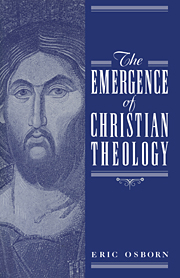Book contents
- Frontmatter
- Contents
- Preface
- List of references
- List of abbreviations
- 1 One God: questions and opposition
- 2 The One and the Mind
- 3 The Bible as the material of theology
- 4 One God as cause and father
- 5 The unity of all things in Christ
- 6 One God in a new way: by the son and spirit
- 7 One good
- 8 One mind, truth and logic
- Conclusion
- Appendices
- Bibliography
- Index of modern writers
- Index of subjects
5 - The unity of all things in Christ
Published online by Cambridge University Press: 23 November 2009
- Frontmatter
- Contents
- Preface
- List of references
- List of abbreviations
- 1 One God: questions and opposition
- 2 The One and the Mind
- 3 The Bible as the material of theology
- 4 One God as cause and father
- 5 The unity of all things in Christ
- 6 One God in a new way: by the son and spirit
- 7 One good
- 8 One mind, truth and logic
- Conclusion
- Appendices
- Bibliography
- Index of modern writers
- Index of subjects
Summary
In the account of God there was a constant stress on unity. God was the unknown, the first cause, the lord, the ruler of history, the father. In all these things he was unique: he was lord and there was no other. In the account of the word of God, there is an equal stress on unity and uniqueness; but the stress is made in a different way. The unity of the word includes rather than excludes. The greatness of the son of God is that his power, presence, truth and reality are universal. There is nothing which can be added to him. Three ideas are used to develop this theme: fulfilment, recapitulation, salvation. These ideas and others describe the totality of the son of God. His work is to complete what commenced at creation, to restore what had fallen away, to redeem what was lost. In this way, Irenaeus challenges the claims of Gnostics to go beyond Jesus and his gospel. There is nothing left to be done after the totality of Christ. Answers to Marcion and to the Jews are also included: Jesus brings creation to its perfection and sums up the old dispensation.
FULFILMENT AND CONTINUITY
One should never begin to make a world unless one can complete it. Jesus finishes all that was partial and fulfils all that was expected of the one who was to come.
Information
- Type
- Chapter
- Information
- The Emergence of Christian Theology , pp. 142 - 172Publisher: Cambridge University PressPrint publication year: 1993
